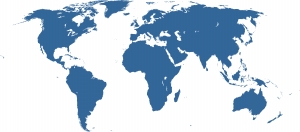
Political risks will dominate the global investment environment next year, leaving investors continuing to seek safe havens, according to Warren Jestin, senior vice president and chief economist at Scotiabank.
“We see a year next year that is really layered very heavily with political risk, almost everywhere you look,” said Jestin, who spoke at the Toronto CFA Society’s annual forecast dinner on Tuesday.
In an interview, he said the outlook for the U.S., in particular, is clouded by political uncertainty, between the upcoming presidential election and key fiscal decisions looming. Regardless of which presidential candidate is elected, Jestin anticipates a “disquieting period” for the markets, as he doesn’t expect a long-term solution to the country’s fiscal problems to be reached anytime soon.
“It’s going to be a Band-Aid, as we’ve seen in the past,” he said. “We’re not going to resolve anything in the U.S.”
Against this backdrop, Jestin anticipates growth of 2-2.5% for the U.S. economy next year, with the housing market and employment showing modest improvement.
Europe also faces considerable uncertainty in 2013, with many European countries likely to remain in recession into next year, Jestin said.
“I would be on the more pessimistic side of the camp with respect to Europe,” Jestin said. He predicts that the continent will still be facing a variety of challenges in five years’ time, given the vast scope of the social, political and demographic issues in that region.
Emerging markets, meanwhile, show stronger prospects for next year. However, growth levels will likely be less robust than those investors are used to seeing. Jestin expects growth of at least 7.5% from China in the next two to three years, and less than 6% growth for India.
“The emerging world is going to be driving global growth next year,” he said.
While emerging market growth will be more subdued than previous years, it will be strong enough to provide some support to commodity prices.
“It doesn’t mean prices aren’t going to come down,” Jestin said, “but what it does mean is that…prices will stay high enough that capital investment will remain strong in the resource sector.”
The Canadian economy is poised to grow roughly in line with the U.S. next year, expanding by 2-2.5%. However, a pullback in the housing market and slower growth in employment could dampen economic expansion in this country.
“That tends to hold back growth,” Jestin said.
In an overall unstable global environment, investors will continue to be wary of taking on risk in 2013, Jestin said.
“Investors will continue to invest in safety, security and liquidity, because they don’t like the shape of the world, at least in the developed world,” he said.
He warned that investors should be cautious of bonds in the current environment. Although Jestin doesn’t expect the Bank of Canada to raise interest rates in 2013, he said bondholders should be anticipating eventual rate hikes.
“From a bond investment point of view, there’s still a lot of potential volatility, and I think all the risk is on the upside,” he said.
In terms of equities, Jestin urges investors to seek out globally diversified companies with strong balance sheets. “There may be some very good stories in the North American space,” he said.